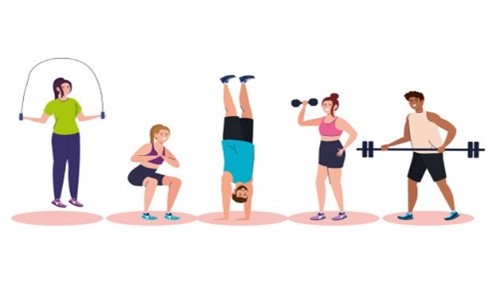
Unit 11
Twelve Fun Facts About Exercising

1.Pre-reading activities.
- What is your favorite kind of exercise?
- How often do you exercise?
- How do you motivate yourself to exercise?
- Reading.
Are you in need of work out motivation? Well, you’re in luck because here are 12 fun facts about exercising that are sure to inspire you.
- Music improves workout performance. Listening to music while exercising can improve work out performance by 15%.
- Exercising improves brain performance. Cardiovascular exercise helps create new brain cells. This enhances brainpower and brain activity.
- Working out sharpens your memory. Exercising increases the production of cells that are responsible for learning and memory.
- Running burns calories! If you run at a 10 minute per mile pace, you can burn 104.3 calories per mile.
- More muscle mass – burning more fat while resting. The more muscle mass you have, the more fat your body burns while resting.
- Exercise prevents signs of ageing. If you exercise 3 times a week for 45 minutes, you can help prevent signs of ageing.
- A pound of muscle burns three times more calories than a pound of fat. Having more muscle than fat means you can consume more calories.
- You get sick less often. Exercising regularly helps boost your immune system. This means you’ll get sick less often than people who don’t exercise.
- Increases productivity. Exercising increases the number of endorphins that are released into your body and increases productivity.
- Workout can improve the look of your skin. Sweat releases dirt through your pores, which reduces acne and breakouts. Workouts improve the overall look of your skin.
- Exercising boosts self-confidence. Exercising can help ease your mind and rejuvenate your body. Working out will make you feel great and boost your confidence.
- Working out enables you to sleep better. If you are someone who has trouble sleeping or staying asleep, then working out is your answer. Exercise helps to clear your head and helps you feel relaxed.
Source: https://athletics.carleton.ca/2015/12-fun-facts-about-exercising/
- Vocabulary work. PLAY, DO and GO with sports and activities.

- Complete the sentences with the correct form of play, do and go.
- My brother likes to _____ volleyball after school.
- John usually _____ horse riding on Sunday morning.
- Dad _____ archery at the country club.
- It’s fun to _____ table-tennis. It’s also called ping pong.
- My cousin loves to _____ skating with his friends.
- Memory game. Follow the link, check your memory and have fun!
https://agendaweb.org/exercises/vocabulary/hobbies/free-time-game-1
- Grammar Spot. Gerunds and infinitives
Meaning and use
Gerunds are the -ing form of a verb, and infinitives are the to + base form. These words can be confusing; they combine the meaning of a verb with the grammar of a noun.
My father asked me to phone him. I enjoy talking with my father.
Using gerunds and infinitives correctly with verbs can be difficult because some verbs go with only the infinitive or only the gerund, and others can go with either one.
I enjoy going to the movies. (enjoy + -ing form only)
Jason wants to visit a museum on Friday. (want + infinitive form only)
Tony likes eating at restaurants. Tony likes to eat at restaurants. (like + either -ing or infinitive form)
The best way to learn which verbs take infinitives, gerunds, or both, is to notice them in context when you read, or to consult grammar references. Here are some of the most common verbs:
Followed by a gerund (-ing form)
admit, advise, consider, discuss, dislike, dread, enjoy, finish, mind, practice, recommend, suggest
Followed by an infinitive
agree, appear, choose, decide, expect, fail, hope, learn, need, refuse, seem, wait, want
Followed by either, usually with no change in meaning
begin, continue, hate, like, love, prefer, start
Followed by either, with a change in meaning
forget, regret, remember, stop, try
Form
Gerunds and infinitives can follow verbs in the form verb + -ing form of the verb or verb + infinitive (to + base form of the verb).
Positive
Theresa suggested going to the park.
Ross decided to go home instead.
Negative
The negative form is verb + not + gerund/infinitive.
My grandparents have retired and enjoy not working.
Frank hopes not to travel over the holidays.
Question
What did the doctor advise taking for your cold?
Do you need to do your laundry this weekend?